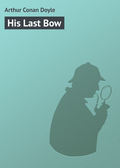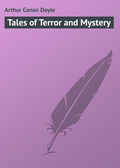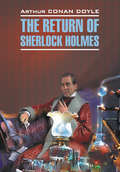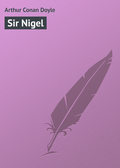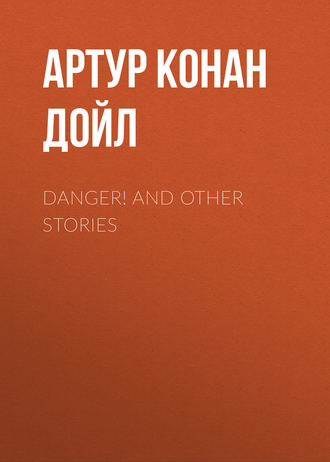
Артур Конан Дойл
Danger! and Other Stories
“Did you ever catch a catch like that, Daddy?”
“No, boy. I was never a particularly good fielder.”
“Did you never catch a good catch?”
“Well, I won’t say that. You see, the best catches are very often flukes, and I remember one awful fluke of that sort.”
“Do tell us, Daddy?”
“Well, dear, I was fielding at slip. That is very near the wicket, you know. Woodcock was bowling, and he had the name of being the fastest bowler of England at that time. It was just the beginning of the match and the ball was quite red. Suddenly I saw something like a red flash and there was the ball stuck in my left hand. I had not time to move it. It simply came and stuck.”
“Oo!”
“I saw another catch like that. It was done by Ulyett, a fine Yorkshire player – such a big, upstanding fellow. He was bowling, and the batsman – it was an Australian in a test match – hit as hard as ever he could. Ulyett could not have seen it, but he just stuck out his hand and there was the ball.”
“Suppose it had hit his body?”
“Well, it would have hurt him.”
“Would he have cried?” from Dimples.
“No, boy. That is what games are for, to teach you to take a knock and never show it. Supposing that – ”
A step was heard coming along the passage.
“Good gracious, boys, here’s Mumty. Shut your eyes this moment. It’s all right, dear. I spoke to them very severely and I think they are nearly asleep.”
“What have you been talking about?” asked the Lady.
“Cwicket!” cried Dimples.
“It’s natural enough,” said Daddy; “of course when two boys – ”
“Three,” said the Lady, as she tucked up the little beds.
III – SPECULATIONS
The three children were sitting together in a bunch upon the rug in the gloaming. Baby was talking so Daddy behind his newspaper pricked up his ears, for the young lady was silent as a rule, and every glimpse of her little mind was of interest. She was nursing the disreputable little downy quilt which she called Wriggly and much preferred to any of her dolls.
“I wonder if they will let Wriggly into heaven,” she said.
The boys laughed. They generally laughed at what Baby said.
“If they won’t I won’t go in, either,” she added.
“Nor me, neither, if they don’t let in my Teddy-bear,” said Dimples.
“I’ll tell them it is a nice, clean, blue Wriggly,” said Baby. “I love my Wriggly.” She cooed over it and hugged it.
“What about that, Daddy?” asked Laddie, in his earnest fashion. “Are there toys in heaven, do you think?”
“Of course there are. Everything that can make children happy.”
“As many toys as in Hamley’s shop?” asked Dimples.
“More,” said Daddy, stoutly.
“Oo!” from all three.
“Daddy, dear,” said Laddie. “I’ve been wondering about the deluge.”
“Yes, dear. What was it?”
“Well, the story about the Ark. All those animals were in the Ark, just two of each, for forty days. Wasn’t that so?”
“That is the story.”
“Well, then, what did the carnivorous animals eat?”
One should be honest with children and not put them off with ridiculous explanations. Their questions about such matters are generally much more sensible than their parents’ replies.
“Well, dear,” said Daddy, weighing his words, “these stories are very, very old. The Jews put them in the Bible, but they got them from the people in Babylon, and the people in Babylon probably got them from some one else away back in the beginning of things. If a story gets passed down like that, one person adds a little and another adds a little, and so you never get things quite as they happened. The Jews put it in the Bible exactly as they heard it, but it had been going about for thousands of years before then.”
“So it was not true?”
“Yes, I think it was true. I think there was a great flood, and I think that some people did escape, and that they saved their beasts, just as we should try to save Nigger and the Monkstown cocks and hens if we were flooded out. Then they were able to start again when the waters went down, and they were naturally very grateful to God for their escape.”
“What did the people who didn’t escape think about it?”
“Well, we can’t tell that.”
“They wouldn’t be very grateful, would they?”
“Their time was come,” said Daddy, who was a bit of a Fatalist. “I expect it was the best thing.”
“It was jolly hard luck on Noah being swallowed by a fish after all his trouble,” said Dimples.
“Silly ass! It was Jonah that was swallowed. Was it a whale, Daddy?”
“A whale! Why, a whale couldn’t swallow a herring!”
“A shark, then?”
“Well, there again you have an old story which has got twisted and turned a good deal. No doubt he was a holy man who had some great escape at sea, and then the sailors and others who admired him invented this wonder.”
“Daddy,” said Dimples, suddenly, “should we do just the same as Jesus did?”
“Yes, dear; He was the noblest Person that ever lived.”
“Well, did Jesus lie down every day from twelve to one?”
“I don’t know that He did.”
“Well, then, I won’t lie down from twelve to one.”
“If Jesus had been a growing boy and had been ordered to lie down by His Mumty and the doctor, I am sure He would have done so.”
“Did He take malt extract?”
“He did what He was told, my son – I am sure of that. He was a good man, so He must have been a good boy – perfect in all He did.”
“Baby saw God yesterday,” remarked Laddie, casually.
Daddy dropped his paper.
“Yes, we made up our minds we would all lie on our backs and stare at the sky until we saw God. So we put the big rug on the lawn and then we all lay down side by side, and stared and stared. I saw nothing, and Dimples saw nothing, but Baby says she saw God.”
Baby nodded in her wise way.
“I saw Him,” she said.
“What was He like, then?”
“Oh, just God.”
She would say no more, but hugged her Wriggly.
The Lady had entered and listened with some trepidation to the frank audacity of the children’s views. Yet the very essence of faith was in that audacity. It was all so unquestionably real.
“Which is strongest, Daddy, God or the Devil?” It was Laddie who was speculating now.
“Why, God rules everything, of course.”
“Then why doesn’t He kill the Devil?”
“And scalp him?” added Dimples.
“That would stop all trouble, wouldn’t it, Daddy?”
Poor Daddy was rather floored. The Lady came to his help.
“If everything was good and easy in this world, then there would be nothing to fight against, and so, Laddie, our characters would never improve.”
“It would be like a football match with all the players on one side,” said Daddy.
“If there was nothing bad, then, nothing would be good, for you would have nothing to compare by,” added the Lady.
“Well, then,” said Laddie, with the remorseless logic of childhood, “if that is so, then the Devil is very useful; so he can’t be so very bad, after all.”
“Well, I don’t see that,” Daddy answered. “Our Army can only show how brave it is by fighting the German Emperor, but that does not prove that the German Emperor is a very nice person, does it now?
“Besides,” Daddy continued, improving the occasion, “you must not think of the Devil as a person. You must think of all the mean things one could do, and all the dirty things, and all the cruel things, and that is really the Devil you are fighting against. You couldn’t call them useful, could you?”
The children thought over this for a little.
“Daddy,” said Laddie, “have you ever seen God?”
“No, my boy. But I see His works. I expect that is as near as we can get in this world. Look at all the stars at night, and think of the Power that made them and keeps each in its proper place.”
“He couldn’t keep the shooting stars in their proper place,” said Dimples.
“I expect He meant them to shoot,” said Laddie.
“Suppose they all shot, what jolly nights we should have!” cried Dimples.
“Yes,” said Laddie; “but after one night they would all have gone, and a nice thing then!”
“Well, there’s always the moon,” remarked Dimples. “But, Daddy, is it true that God listens to all we say?”
“I don’t know about that,” Daddy answered, cautiously. You never know into what trap those quick little wits may lead you. The Lady was more rash, or more orthodox.
“Yes, dear, He does hear all you say.”
“Is He listenin’ now?”
“Yes, dear.”
“Well, I call it vewy rude of Him!”
Daddy smiled, and the Lady gasped.
“It isn’t rude,” said Laddie. “It is His duty, and He has to notice what you are doing and saying. Daddy, did you ever see a fairy?”
“No, boy.”
“I saw one once.”
Laddie is the very soul of truth, quite painfully truthful in details, so that his quiet remark caused attention.
“Tell us about it, dear.”
He described it with as little emotion as if it were a Persian cat. Perhaps his perfect faith had indeed opened something to his vision.
“It was in the day nursery. There was a stool by the window. The fairy jumped on the stool and then down, and went across the room.”
“What was it dressed like?”
“All in grey, with a long cloak. It was about as big as Baby’s doll. I could not see its arms, for they were under the cloak.”
“Did he look at you?”
“No, he was sideways, and I never really saw his face. He had a little cap. That’s the only fairy I ever saw. Of course, there was Father Christmas, if you call him a fairy.”
“Daddy, was Father Christmas killed in the war?”
“No, boy.”
“Because he has never come since the war began. I expect he is fightin’ the Jarmans.” It was Dimples who was talking.
“Last time he came,” said Laddie, “Daddy said one of his reindeers had hurt its leg in the ruts of the Monkstown Lane. Perhaps that’s why he never comes.”
“He’ll come all right after the war,” said Daddy, “and he’ll be redder and whiter and jollier than ever.” Then Daddy clouded suddenly, for he thought of all those who would be missing when Father Christmas came again. Ten loved ones were dead from that one household. The Lady put out her hand, for she always knew what Daddy was thinking.
“They will be there in spirit, dear.”
“Yes, and the jolliest of the lot,” said Daddy, stoutly. “We’ll have our Father Christmas back and all will be well in England.”
“But what do they do in India?” asked Laddie.
“Why, what’s wrong with them?”
“How do the sledge and the reindeer get across the sea? All the parcels must get wet.”
“Yes, dear, there have been several complaints,” said Daddy, gravely. “Halloa, here’s nurse! Time’s up! Off to bed!”
They got up resignedly, for they were really very good children. “Say your prayers here before you go,” said the Lady. The three little figures all knelt on the rug, Baby still cuddling her Wriggly.
“You pray, Laddie, and the rest can join in.”
“God bless every one I love,” said the high, clear child-voice. “And make me a good boy, and thank You so much for all the blessings of to-day. And please take care of Alleyne, who is fighting the Germans, and Uncle Cosmo, who is fighting the Germans, and Uncle Woodie, who is fighting the Germans, and all the others who are fighting the Germans, and the men on the ships on the sea, and Grandma and Grandpa, and Uncle Pat, and don’t ever let Daddy and Mumty die. That’s all.”
“And please send plenty sugar for the poor people,” said Baby, in her unexpected way.
“And a little petrol for Daddy,” said Dimples.
“Amen!” said Daddy. And the little figures rose for the good-night kiss.
IV – THE LEATHERSKIN TRIBE
“Daddy!” said the elder boy. “Have you seen wild Indians?”
“Yes, boy.”
“Have you ever scalped one?”
“Good gracious, no.”
“Has one ever scalped you?” asked Dimples.
“Silly!” said Laddie. “If Daddy had been scalped he wouldn’t have all that hair on his head – unless perhaps it grew again!”
“He has none hair on the very top,” said Dimples, hovering over the low chair in which Daddy was sitting.
“They didn’t scalp you, did they, Daddy?” asked Laddie, with some anxiety.
“I expect Nature will scalp me some of these days.”
Both boys were keenly interested. Nature presented itself as some rival chief.
“When?” asked Dimples, eagerly, with the evident intention of being present.
Daddy passed his fingers ruefully through his thinning locks. “Pretty soon, I expect,” said he.
“Oo!” said the three children. Laddie was resentful and defiant, but the two younger ones were obviously delighted.
“But I say, Daddy, you said we should have an Indian game after tea. You said it when you wanted us to be so quiet after breakfast. You promised, you know.”
It doesn’t do to break a promise to children. Daddy rose somewhat wearily from his comfortable chair and put his pipe on the mantelpiece. First he held a conference in secret with Uncle Pat, the most ingenious of playmates. Then he returned to the children. “Collect the tribe,” said he. “There is a Council in a quarter of an hour in the big room. Put on your Indian dresses and arm yourselves. The great Chief will be there!”
Sure enough when he entered the big room a quarter of an hour later the tribe of the Leatherskins had assembled. There were four of them, for little rosy Cousin John from next door always came in for an Indian game. They had all Indian dresses with high feathers and wooden clubs or tomahawks. Daddy was in his usual untidy tweeds, but carried a rifle. He was very serious when he entered the room, for one should be very serious in a real good Indian game. Then he raised his rifle slowly over his head in greeting and the four childish voices rang out in the war-cry. It was a prolonged wolfish howl which Dimples had been known to offer to teach elderly ladies in hotel corridors. “You can’t be in our tribe without it, you know. There is none body about. Now just try once if you can do it.” At this moment there are half-a-dozen elderly people wandering about England who have been made children once more by Laddie and Dimples.
“Hail to the tribe!” cried Daddy.
“Hail, Chief!” answered the voices.
“Red Buffalo!”
“Here!” cried Laddie.
“Black Bear!”
“Here!” cried Dimples.
“White Butterfly!”
“Go on, you silly squaw!” growled Dimples.
“Here,” said Baby.
“Prairie Wolf!”
“Here,” said little four-year-old John.
“The muster is complete. Make a circle round the camp-fire and we shall drink the firewater of the Palefaces and smoke the pipe of peace.”
That was a fearsome joy. The fire-water was ginger-ale drunk out of the bottle, which was gravely passed from hand to hand. At no other time had they ever drunk like that, and it made an occasion of it which was increased by the owlish gravity of Daddy. Then he lit his pipe and it was passed also from one tiny hand to another, Laddie taking a hearty suck at it, which set him coughing, while Baby only touched the end of the amber with her little pink lips. There was dead silence until it had gone round and returned to its owner.
“Warriors of the Leatherskins, why have we come here?” asked Daddy, fingering his rifle.
“Humpty Dumpty,” said little John, and the children all began to laugh, but the portentous gravity of Daddy brought them back to the warrior mood.
“The Prairie Wolf has spoken truly,” said Daddy. “A wicked Paleface called Humpty Dumpty has taken the prairies which once belonged to the Leatherskins and is now camped upon them and hunting our buffaloes. What shall be his fate? Let each warrior speak in turn.”
“Tell him he has jolly well got to clear out,” said Laddie.
“That’s not Indian talk,” cried Dimples, with all his soul in the game. “Kill him, great Chief – him and his squaw, too.” The two younger warriors merely laughed and little John repeated “Humpty Dumpty!”
“Quite right! Remember the villain’s name!” said Daddy. “Now, then, the whole tribe follows me on the war-trail and we shall teach this Paleface to shoot our buffaloes.”
“Look here, we don’t want squaws,” cried Dimples, as Baby toddled at the rear of the procession. “You stay in the wigwam and cook.”
A piteous cry greeted the suggestion.
“The White Butterfly will come with us and bind up the wounds,” said Daddy.
“The squaws are jolly good as torturers,” remarked Laddie.
“Really, Daddy, this strikes me as a most immoral game,” said the Lady, who had been a sympathetic spectator from a corner, doubtful of the ginger-ale, horrified at the pipe, and delighted at the complete absorption of the children.
“Rather!” said the great Chief, with a sad relapse into the normal. “I suppose that is why they love it so. Now, then, warriors, we go forth on the war-trail. One whoop all together before we start. Capital! Follow me, now, one behind the other. Not a sound! If one gets separated from the others let him give the cry of a night owl and the others will answer with the squeak of the prairie lizard.”
“What sort of a squeak, please?”
“Oh, any old squeak will do. You don’t walk. Indians trot on the war-path. If you see any man hiding in a bush kill him at once, but don’t stop to scalp him – ”
“Really, dear!” from the corner.
“The great Queen would rather that you scalp him. Now, then! All ready! Start!”
Away went the line of figures, Daddy stooping with his rifle at the trail, Laddie and Dimples armed with axes and toy pistols, as tense and serious as any Redskins could be. The other two rather more irresponsible but very much absorbed all the same. The little line of absurd figures wound in and out of the furniture, and out on to the lawn, and round the laurel bushes, and into the yard, and back to the clump of trees. There Daddy stopped and held up his hand with a face that froze the children.
“Are all here?” he asked.
“Yes, yes.”
“Hush, warriors! No sound. There is an enemy scout in the bushes ahead. Stay with me, you two. You, Red Buffalo, and you, Black Bear, crawl forward and settle him. See that he makes no sound. What you do must be quick and sudden. When all is clear give the cry of the wood-pigeon, and we will join you.”
The two warriors crawled off in most desperate earnest. Daddy leaned on his gun and winked at the Lady, who still hovered fearfully in the background like a dear hen whose chickens were doing wonderful and unaccountable things. The two younger Indians slapped each other and giggled. Presently there came the “coo” of a wood-pigeon from in front. Daddy and the tribe moved forward to where the advance guard were waiting in the bushes.
“Great Chief, we could find no scout,” said Laddie.
“There was none person to kill,” added Dimples.
The Chief was not surprised, since the scout had been entirely of his own invention. It would not do to admit it, however.
“Have you found his trail?” he asked.
“No, Chief.”
“Let me look.” Daddy hunted about with a look of preternatural sagacity about him. “Before the snows fell a man passed here with a red head, grey clothes, and a squint in his left eye. His trail shows that his brother has a grocer’s shop and his wife smokes cigarettes on the sly.”
“Oh, Daddy, how could you read all that?”
“It’s easy enough, my son, when you get the knack of it. But look here, we are Indians on the war-trail, and don’t you forget it if you value your scalp! Aha, here is Humpty Dumpty’s trail!”
Uncle Pat had laid down a paper trail from this point, as Daddy well knew; so now the children were off like a little pack of eager harriers, following in and out among the bushes. Presently they had a rest.
“Great Chief, why does a wicked Paleface leave paper wherever he goes?”
Daddy made a great effort.
“He tears up the wicked letters he has written. Then he writes others even wickeder and tears them up in turn. You can see for yourself that he leaves them wherever he goes. Now, warriors, come along!”
Uncle Pat had dodged all over the limited garden, and the tribe followed his trail. Finally they stopped at a gap in the hedge which leads into the field. There was a little wooden hut in the field, where Daddy used to go and put up a printed cardboard: “WORKING.” He found it a very good dodge when he wanted a quiet smoke and a nap. Usually there was nothing else in the field, but this time the Chief pushed the whole tribe hurriedly behind the hedge, and whispered to them to look carefully out between the branches.
In the middle of the field a tripod of sticks supported a kettle. At each side of it was a hunched-up figure in a coloured blanket. Uncle Pat had done his work skilfully and well.
“You must get them before they can reach their rifles,” said the Chief. “What about their horses? Black Bear, move down the hedge and bring back word about their horses. If you see none give three whistles.”
The whistles were soon heard, and the warrior returned.
“If the horses had been there, what would you have done?”
“Scalped them!” said Dimples.
“Silly ass!” said Laddie. “Who ever heard of a horse’s scalp? You would stampede them.”
“Of course,” said the Chief. “If ever you see a horse grazing, you crawl up to it, spring on its back and then gallop away with your head looking under its neck and only your foot to be seen. Don’t you forget it. But we must scupper these rascals on our hunting-grounds.”
“Shall we crawl up to them?”
“Yes, crawl up. Then when I give a whoop rush them. Take them alive. I wish to have a word with them first. Carry them into the hut. Go!”
Away went the eager little figures, the chubby babes and the two lithe, active boys. Daddy stood behind the bush watching them. They kept a line and tip-toed along to the camp of the strangers. Then on the Chief’s signal they burst into a cry and rushed wildly with waving weapons into the camp of the Palefaces. A moment later the two pillow-made trappers were being dragged off into the hut by the whooping warriors. They were up-ended in one corner when the Chief entered, and the victorious Indians were dancing about in front of them.
“Anybody wounded?” asked the Chief.
“No, no.”
“Have you tied their hands?”
With perfect gravity Red Buffalo made movements behind each of the pillows.
“They are tied, great Chief.”
“What shall we do with them?”
“Cut off their heads!” shrieked Dimples, who was always the most bloodthirsty of the tribe, though in private life he had been known to weep bitterly over a squashed caterpillar.
“The proper thing is to tie them to a stake,” said Laddie.
“What do you mean by killing our buffaloes?” asked Daddy, severely.
The prisoners preserved a sulky silence.
“Shall I shoot the green one?” asked Dimples, presenting his wooden pistol.
“Wait a bit!” said the Chief. “We had best keep one as a hostage and send the other back to say that unless the Chief of the Palefaces pays a ransom within three days – ”
But at that moment, as a great romancer used to say, a strange thing happened. There was the sound of a turning key and the whole tribe of the Leatherskins was locked into the hut. A moment later a dreadful face appeared at the window, a face daubed with mud and overhung with grass, which drooped down from under a soft cap. The weird creature danced in triumph, and then stooped to set a light to some paper and shavings near the window.
“Heavens!” cried the Chief. “It is Yellow Snake, the ferocious Chief of the Bottlenoses!”
Flame and smoke were rising outside. It was excellently done and perfectly safe, but too much for the younger warriors. The key turned, the door opened, and two tearful babes were in the arms of the kneeling Lady. Red Buffalo and Black Bear were of sterner stuff.
“I’m not frightened, Daddy,” said Laddie, though he looked a little pale.
“Nor me,” cried Dimples, hurrying to get out of the hut.
“We’ll lock the prisoners up with no food and have a council of war upon them in the morning,” said the Chief. “Perhaps we’ve done enough to-day.”
“I rather think you have,” said the Lady, as she soothed the poor little sobbing figures.
“That’s the worst of having kids to play,” said Dimples. “Fancy having a squaw in a war-party!”
“Never mind, we’ve had a jolly good Indian game,” said Laddie, as the sound of a distant bell called them all to the nursery tea.



